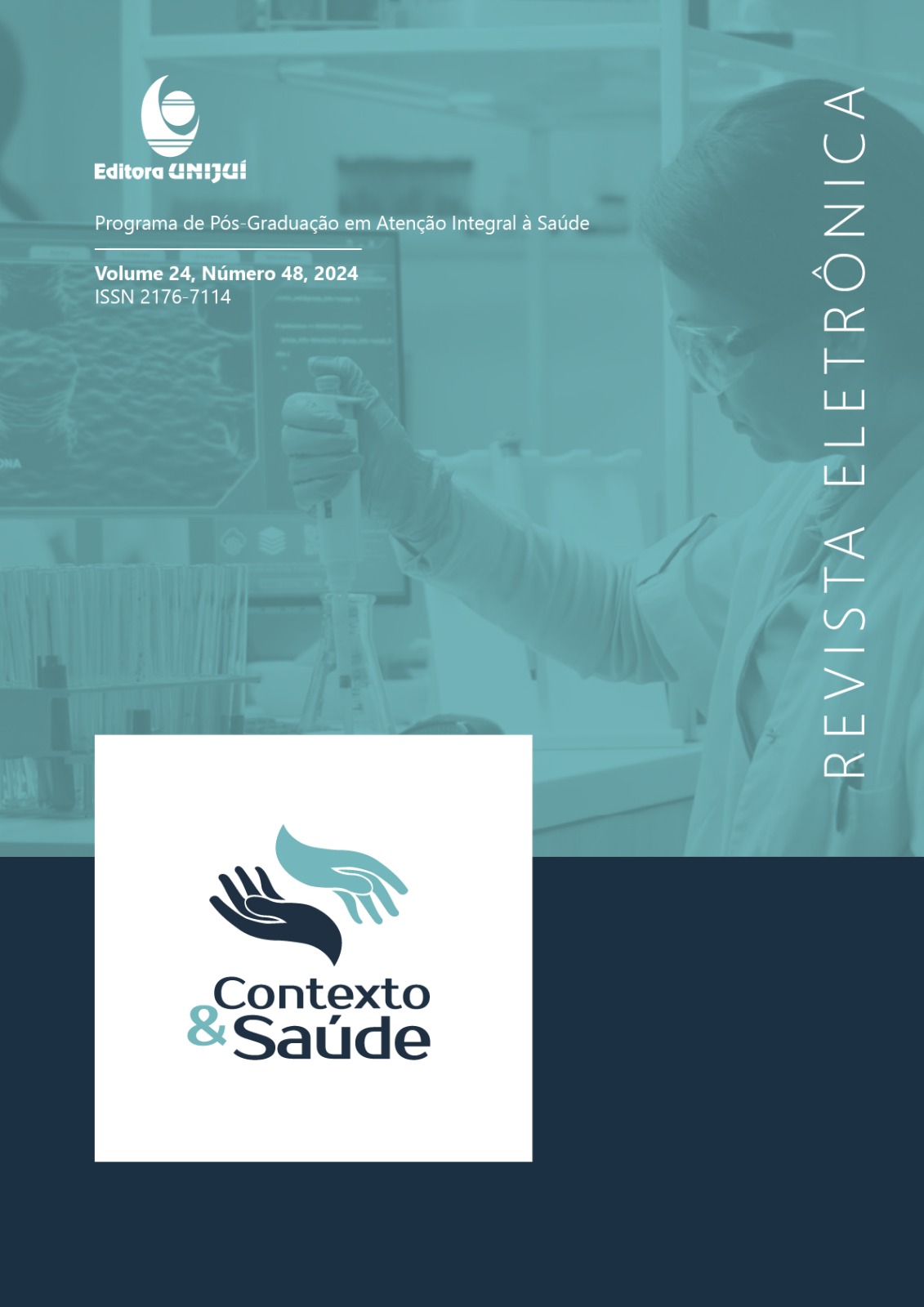Talidomida no manejo da dor em endometriose: uma revisão de escopo de estudos experimentais
DOI:
https://doi.org/10.21527/2176-7114.2024.48.14845Palavras-chave:
Dor, Manejo da dor, Endometriose, TalidomidaResumo
Este estudo buscou investigar a aplicabilidade da talidomida no manejo da dor na endometriose induzida em animais. Foi realizada uma revisão de escopo confeccionada e organizada seguindo o método Joanna Briggs Institute, além de seguir os padrões do PRISMA – ScR. Foram feitas pesquisas em seis bases de dados eletrônicas associando descritores e as palavras chaves, por meio de busca booleana correspondente aos blocos conceituais voltados para recuperação de estudos sobre endometriose, dor, manejo da dor e talidomida. Os países dos estudos foram: Irã (n =1, 50%) e Turquia (n = 1, 50%). Todos os artigos (n = 2; 100%) foram publicados em inglês. Quanto ao ano de publicação, observa-se que todos foram publicados nos últimos 10 anos. Nos estudos onde há comparação entre talidomida e placebo observa-se que há uma alta resposta associada com a redução de fatores inflamatórios impactando diretamente na melhora clínica dos quadros álgicos com benefícios que levam até a redução de fatores de crescimento e controle do ciclo das metaloproteinases (MPP). A busca dos estudos mostrou a atividade antiangiogênica e anti-inflamatória do fármaco, o que sugere uma opção para ser utilizada como tratamento de dor, contudo poucas literaturas estão disponíveis com talidomida.
Referências
Azimirad A, Alborzi S, Kumar PV, Zolghadri J, Zarei A, Tavana Z, et al. Thalidomide affects experimental endometriosis: a randomized controlled study in the rat. J Obstet Gynaecol Res. 2014;40(8):1.989-1.997. DOI: 10.1111/jog.12434.
Chen FY, Wang X, Tang RY, Guo ZX, Deng YZJ, Yu Q. New therapeutic approaches for endometriosis besides hormonal therapy. Chin Med J (Engl). 2019;132(24):2.984-2.993. DOI: 10.1097/CM9.0000000000000569.
Valerio FP. Influence of doxycycline on experimentally induced endometriosis in rats [dissertation]. Ribeirão Preto: University of São Paulo, Faculty of Medicine of Ribeirão Preto; 2018 [cited 2023 Jul. 13]. DOI:10.11606/D.17.2018.tde-19072018-115724.
Brazilian Federation of Gynecology and Obstetrics Associations. Endometriosis. Protocolo Febrasgo Ginecologia. 2021 [cited 2023 Jul. 13];(78):1-16. Available from: https://sogirgs.org.br/area-do-associado/Endometriose-2021.pdf.
Antônio LGL, Rosa-e-Silva JC, Machado DJ, Westin AT, Garcia SB, et al. Thalidomide reduces cell proliferation in experimentally induced endometriosis in rats. Rev Bras Ginecol and Obstet. 2019;41(11):668-672. DOI: 10.1055/s-0039-3399551.
Maddern J, Grundy L, Castro J, Brierley SM. Pain in endometriosis. Front Cell Neurosci. 2020;14:590823. DOI: 10.3389/fncel.2020.590823.
Gruber TM, Mechsner S. Pathogenesis of endometriosis: the origin of pain and subfertility. Cells. 2021;10(6):1.381. DOI: 10.3390/cells10061381.
Silva HM, Melo HCS. Talidomida: aspectos históricos e atuais de seu uso no Brasil. Rev Saúde Educ. 2018;3(1):109-123.
Tricco AC, Lillie E, Zarin W, O'Brien K, Colquhoun H, Kastner M, et al. A scoping review on the conduct and reporting of scoping reviews. BMC Med Res Methodol. 2016;16:15. DOI: 10.1186/s12874-016-0116-4.
Peters MDJ, Godfrey C, McInerney P, Munn Z, Tricco AC, Khalil H. Scoping reviews. In: Aromataris E, Munn Z, editors. JBI manual for evidence synthesis. Adelaide: JBI; 2020.
Tricco AC, Lillie E, Zarin W, O'Brien KK, Colquhoun H, Levac D, et al. PRISMA extension for scoping reviews (PRISMA-ScR): Checklist and explanation. Ann Intern Med 2018;169(7):467-473. DOI: 10.7326/M18-0850.
McGowan J, Straus S, Moher D, Langlois EV, O'Brien KK, Horsley T, et al. Reporting scoping reviews-PRISMA ScR extension. J Clin Epidemiol. 2020;123:177-179. DOI: 10.1016/j.jclinepi.2020.03.016.
Bakacak M, Ercan Ö, Köstü B, Bostancı MS, İnanç F, Yaylalı A, et al. The effects of thalidomide in a rat model of surgically-induced endometriosis. Turk J Obstet Gynecol. 2015;12(3):125-131. DOI: 10.4274/tjod.71601.
Downloads
Publicado
Como Citar
Edição
Seção
Licença
Copyright (c) 2024 Revista Contexto & Saúde

Este trabalho está licenciado sob uma licença Creative Commons Attribution 4.0 International License.
Ao publicar na Revista Contexto & Saúde, os autores concordam com os seguintes termos:
Os trabalhos seguem a licença Creative Commons Atribuição 4.0 Internacional (CC BY 4.0), que permite:
Compartilhar — copiar e redistribuir o material em qualquer meio ou formato;
Adaptar — remixar, transformar e criar a partir do material para qualquer fim, inclusive comercial.
Essas permissões são irrevogáveis, desde que respeitados os seguintes termos:
Atribuição — os autores devem ser devidamente creditados, com link para a licença e indicação de eventuais alterações realizadas.
Sem restrições adicionais — não podem ser aplicadas condições legais ou tecnológicas que restrinjam o uso permitido pela licença.
Avisos:
A licença não se aplica a elementos em domínio público ou cobertos por exceções legais.
A licença não garante todos os direitos necessários para usos específicos (ex.: direitos de imagem, privacidade ou morais).
A revista não se responsabiliza pelas opiniões expressas nos artigos, que são de exclusiva responsabilidade dos autores. O Editor, com o apoio do Comitê Editorial, reserva-se o direito de sugerir ou solicitar modificações quando necessário.
Somente serão aceitos artigos científicos originais, com resultados de pesquisas de interesse que não tenham sido publicados nem submetidos simultaneamente a outro periódico com o mesmo objetivo.
A menção a marcas comerciais ou produtos específicos destina-se apenas à identificação, sem qualquer vínculo promocional por parte dos autores ou da revista.
Contrato de Licença (para artigos publicados a partir de setembro/2025): Os autores mantém os direitos autorais sobre seu artigo, e concedem à Revista Contexto & Saúde o direito de primeira publicação.

